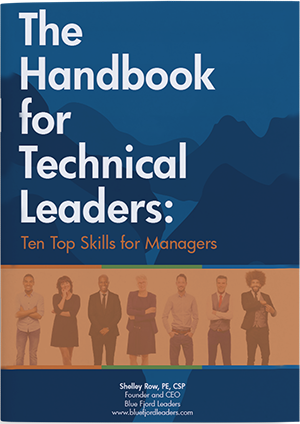
Why smart people struggle in leadership positions & why technical experts need people skills
You sensed it for some time. You know technically what is the right answer. And it’s not enough. You sense that you aren’t as effective or influential as you should be – given all that you know. You might be the smartest person in the room, but technical experts need people smarts to be a leader.
I’ll spare you the research. No, I won’t. As a group we like research (see the end note.) But you don’t really need the research because you already know the answer. Technical smarts don’t equate to people smarts. If you want to move up and be successful in management roles, people smarts are essential. The lack of respect for people smarts can be our downfall.
This is NOT a news flash! Throughout my career, we lamented the difficulties that engineers have making the leap into management due mainly to the lack of fully developed people smarts. I interviewed 18 leaders in technical organizations (associations, consultants, government) about this problem. Here are four of their observations.
“Just because you have a technically correct answer doesn’t mean it’s the correct solution to the problem. The correct solution must not only be technically correct, but it also must be palatable to your audience. Having some humility is incredibly important, because when you walk into a room … there’s no better way to lose credibility than to walk in like you know it all.
I’ve watched people who are smart individuals, very technically solid and good, but they are viewed as roadblocks instead of facilitators. You need to be grounded in good technical knowledge as an engineer, but you must be able to move past just the technical details and understand how to make the tradeoffs. ” —David Thatcher, Stantec
“I think one of the challenges is that the natural career progression of a very good engineer is to become a leader or manager. They’re very good at engineering but the softer side of management and leadership was not part of their school program or career track up to that point. So, it’s that Peter Principle of getting into a position that you’re not as well equipped to do. As your career progresses, engineers should seek training or resources to improve on the softer side of management.” —Erin Flanigan, Cambridge Systematics
“I think when engineers become managers, they think, ‘OK, I’m going to make this work.’ But they must realize that in any meeting, they’re probably not the smartest person in the room, especially on the subject being talked about. You can’t do your job without the other people.” —Sandy Otto, FHWA retired
“In the leadership arena, you need to supplement (technical skills) with emotional intelligence, business acumen, and communication skills to make it work. The challenge is that when our engineers finished their education, they may be very good technically, but they may not be as good in all these other areas. That’s where I think we can learn. We can change. We can develop new skills.” —Maurice Rached, Maser Consulting
It’s clear that we know people smarts are essential. So why is this a continual struggle? And what can we do about it?
Tips for smart people who want to also become great leaders
- Talk about the need for people smarts. We as leaders need to be explicit about the essential role that people smarts play in an upward career trajectory. Technical professionals who are interested in moving into management positions (and not all are) need to be to told that people smarts are essential, not optional, skills. It’s like statics and dynamics: people smarts are the foundational skills
- for management and leadership.
- Support (and pay) for this skill development. You’re thinking, “But we already support this!” Then we’re keeping it a secret. For example, professional associations create programs with topics of interest to their members. The forward-thinking associations include programs on communication, presentation, and management skills only to find that these sessions are lightly attended. Conference planners then base their decisions for future sessions on attendance and are reluctant to support “soft skills” because no one goes. Participants don’t go to those sessions because they believe they will receive approval to attend if they take technical sessions. And around and around it goes. Instead, when you approve your staff to attend a conference, encourage – no, require – they split their time growing technical smarts and people smarts.
- Stop thinking that OJT does the trick. You don’t become a pro basketball player by only playing pick-up ball in the community lot. Nor are pro teams coached by the players on the bench. Pro teams have a coach skilled in developing and coaching the players. Similarly, it’s rare that you become a high-functioning communicator, compelling presenter, and inspiring leader by osmosis. Through many interviews I discovered some organizations believe that technical staff will learn management skills by observation. Maybe, but it’s far from a sure thing. Other organizations use their own staff to deliver “soft skills” training. This is sub-optimal for everyone. Internal staff are not typically trained developers and speakers. Plus, attempting to be a trainer takes them away from their day jobs for which they are very well suited and paid. (That said, I agree with using internal staff to train internal business processes.) Rare is the organization who brings in skilled trainers within our industry who know how to develop skills that stick.
- Take matters into your own hands. If you can’t get training in communication and management skills through your workplace, find it yourself. There are lots of opportunities (yes, Blue Fjord Leader is one but certainly not the only one but perhaps the best one ?). Make a realistic assessment of the skills needed for your future. Find the training you need now, delivered in a format that fits your life, and get going. You are in control of your future. Few skills are more worthy of your time, attention, and investment than growing people smarts.
Let’s be clear. The lack of people smarts is a showstopper to your career and organization. Let’s collectively raise our voices to take people skills as seriously as technical skills.
While some research indicates a modest correlation between IQ and success in the workplace. Other studies cite a correlation between IQ and income and/or social factors. Add to that the element about EQ or emotional intelligence and the picture becomes less clear still. Much research suggests that ability to understand and cooperate with others may predict success in multiple areas of life. A study of medical students indicated that the ability to regulate one’s emotions was an especially significant predictor of higher income, socioeconomic status, and greater overall well-being. Can IQ Tests Really Predict Your Success in Life? 11/28/18, GoodTherapy.org.





0 Comments